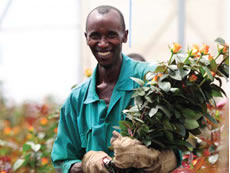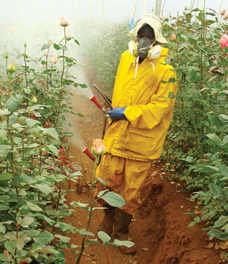DowDuPont Agriculture Division is Now Corteva Agriscience™
The Floriculture Magazine spoke to Corteva Agriscience™ Agriculture Division of DowDuPont Chief Operating Officer Mr. James C. Collins in a round table meeting with journalists. We engaged him on the state of agriculture and how technology can be used to boost output and support food security while taking care of emerging environmental and health concerns. He was in Nairobi accompanied by other senior company staff from Africa and Middle East region.
What brings you to Kenya?  Two years ago, Dow and DuPont made a very deliberate decision to merge and create three standalone companies, including a pure play agriculture company. End of February, the company announced brand names for the three independent companies, reflecting ongoing progress towards separations to serve their consumers better. At the same time, we are focusing on building our business in sub-Saharan Africa. As part of that decision, we located our East Africa headquarters in Nairobi. We have a leadership team for East African region here — from where we are trying to build a foundation for agriculture in the region. That’s why we are placing a lot of emphasis in this part of the world.
Two years ago, Dow and DuPont made a very deliberate decision to merge and create three standalone companies, including a pure play agriculture company. End of February, the company announced brand names for the three independent companies, reflecting ongoing progress towards separations to serve their consumers better. At the same time, we are focusing on building our business in sub-Saharan Africa. As part of that decision, we located our East Africa headquarters in Nairobi. We have a leadership team for East African region here — from where we are trying to build a foundation for agriculture in the region. That’s why we are placing a lot of emphasis in this part of the world.
What does this mean to Kenya’s Agricultural Sector?
In Corteva Agriscience™, we bring together three businesses with deep connections and dedication to generations of farmers. Our new name reflects our commitment to enhancing their productivity as well as the health and well-being of the consumers they serve. Our name reflects our purpose: enriching the lives of those who produce and those who consume, ensuring progress for generations to come. With the most balanced portfolio of products in the industry, nearly a century of agronomic expertise, and an unparalleled innovation engine, we are creating a new agriculture company that will work together with the entire food ecosystem to produce a secure supply of healthy food sustainably and efficiently. Other than the regional headquarters, we have also built a state of the art seed production facility which we will be improving to higher standards, we have a research centre, that is part of the Africa Technology hub and we are investing in talent.

 When it comes to branding and your exhibition stand, you only really get one chance to impress. This is not only because once the exhibition stand is on the trade show floor it cannot be modified, but also because often exhibition visitors will pass by the exhibition stand once only.
When it comes to branding and your exhibition stand, you only really get one chance to impress. This is not only because once the exhibition stand is on the trade show floor it cannot be modified, but also because often exhibition visitors will pass by the exhibition stand once only.

 Many farmers grow cut flowers for export in Kenya. Proper harvesting and care of flowers after harvest are important to maximize the vase life and ensure a high quality product.
Many farmers grow cut flowers for export in Kenya. Proper harvesting and care of flowers after harvest are important to maximize the vase life and ensure a high quality product. When I first visited Select Breeding at their new show case at Naivasha, it was on invitation by Michael de Geus; the Managing Director, Select breeding. This was on 25th to 27th of January when the company held their first showhouse at Oserian two lakes to display their commercial varieties available in the market and other new varieties.
When I first visited Select Breeding at their new show case at Naivasha, it was on invitation by Michael de Geus; the Managing Director, Select breeding. This was on 25th to 27th of January when the company held their first showhouse at Oserian two lakes to display their commercial varieties available in the market and other new varieties. Agriculture in the whirlpool of large and niche market
Agriculture in the whirlpool of large and niche market